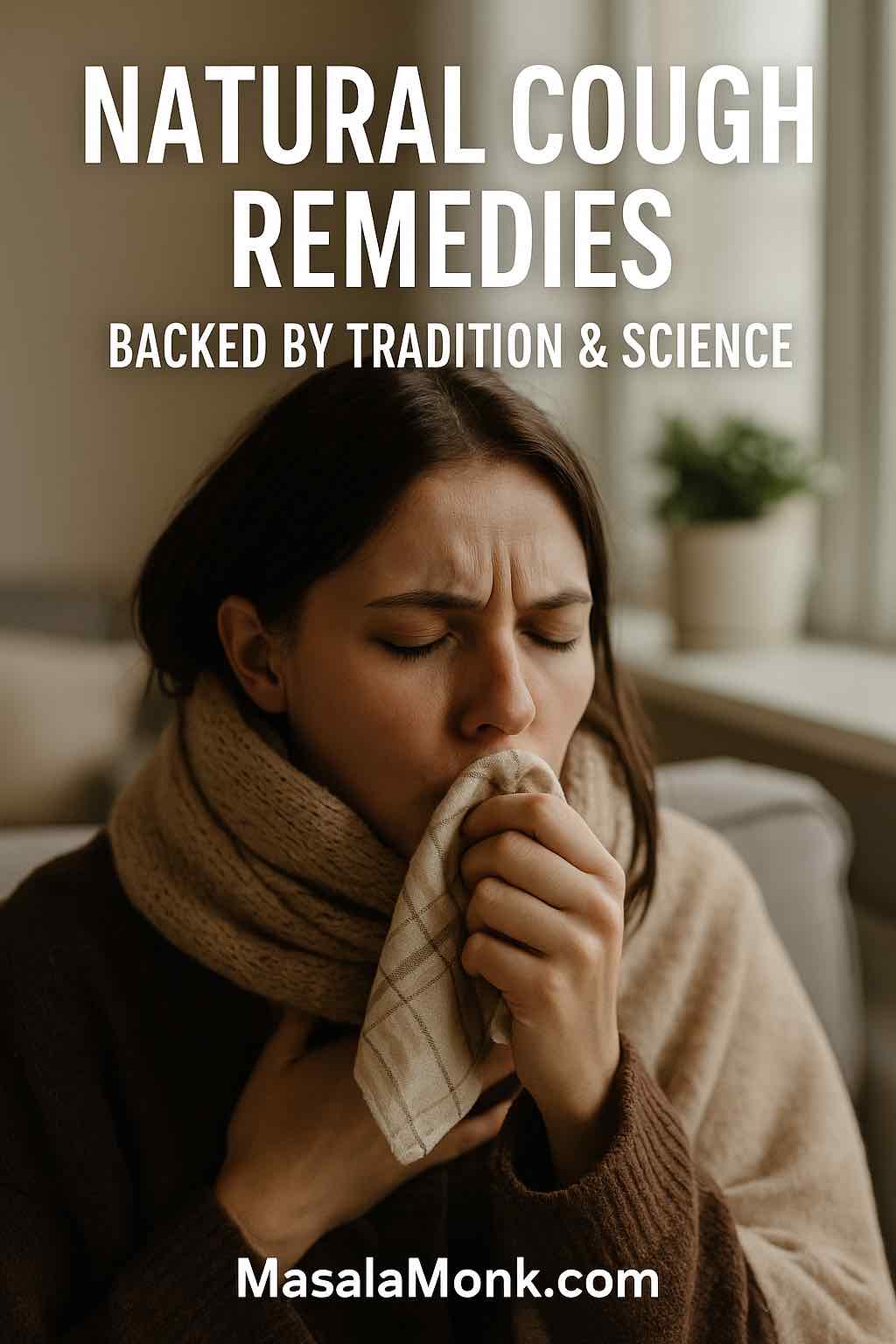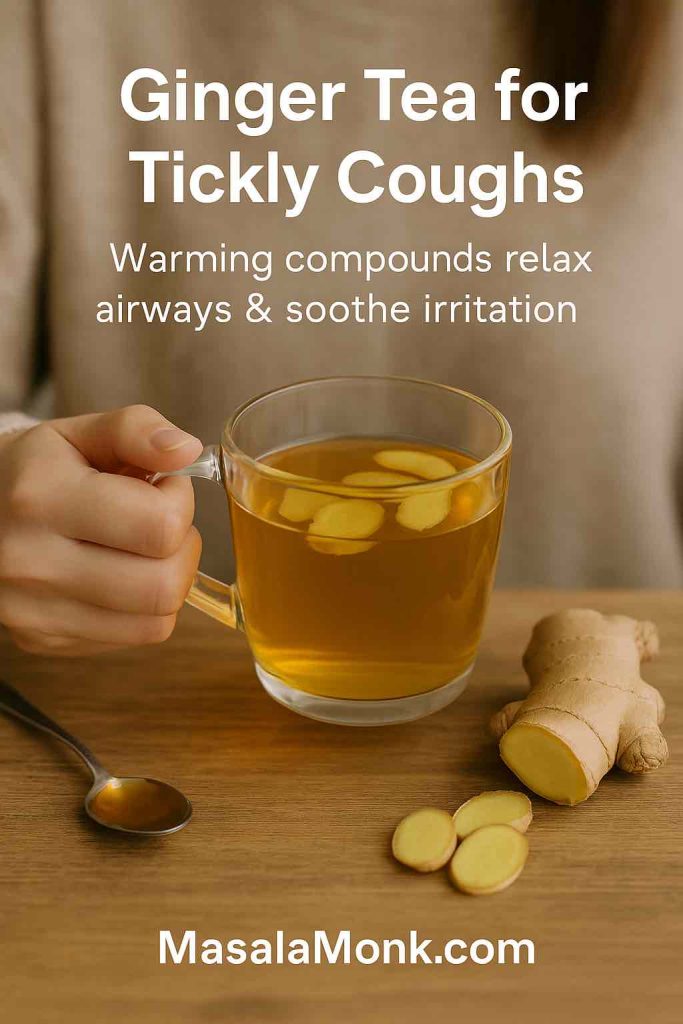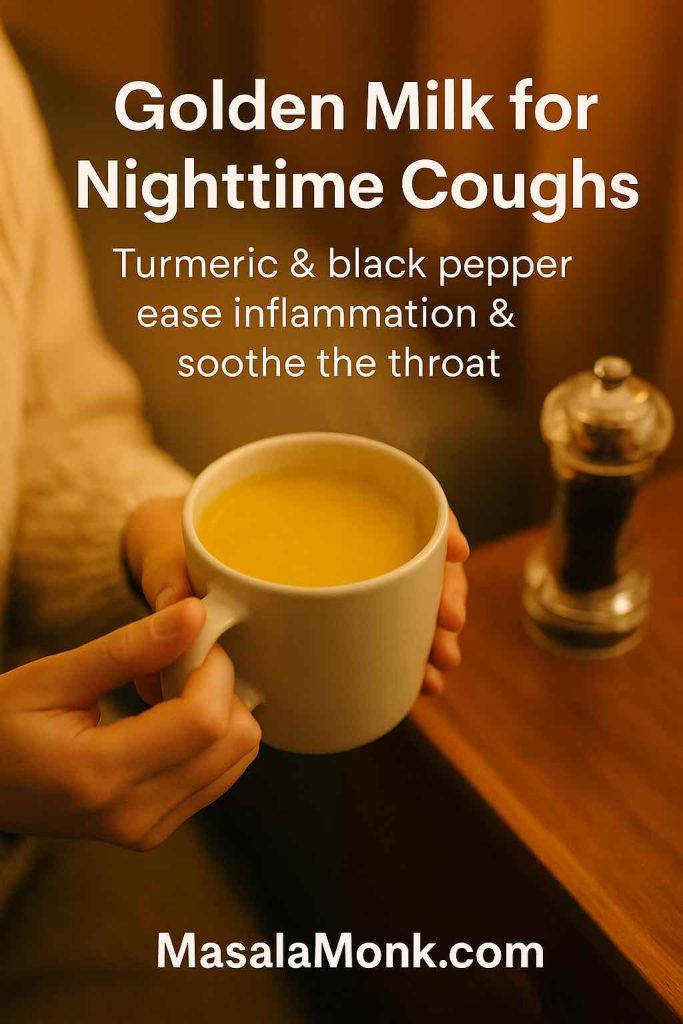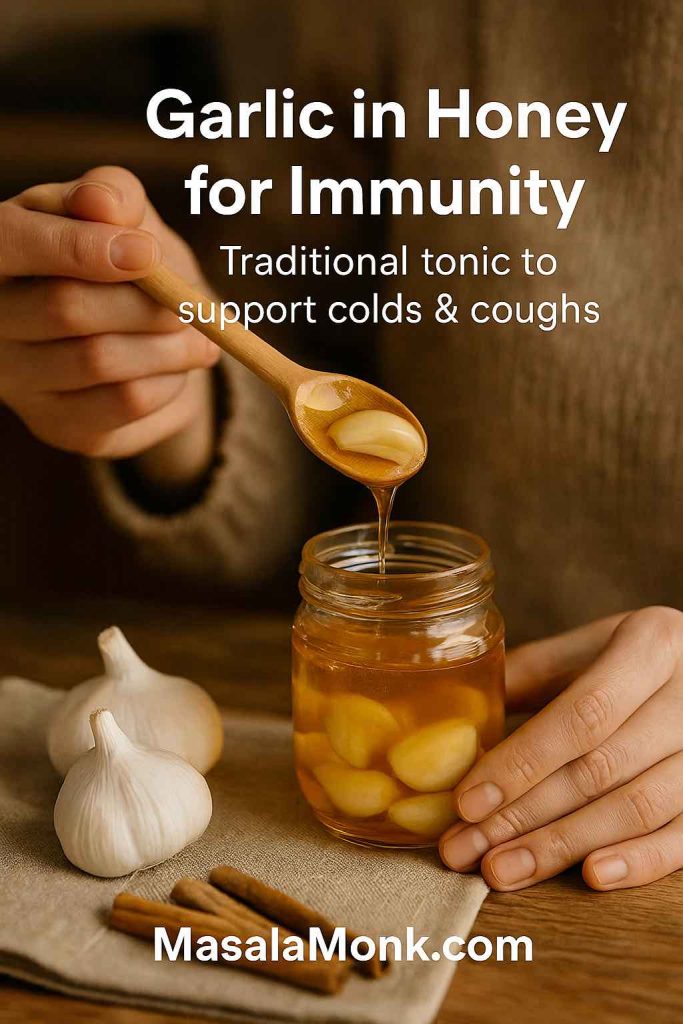
A cough can sneak up at the worst times — in the middle of the night, during a meeting, or just when you think that cold has finally gone away. While pharmacy shelves are full of syrups and lozenges, many of us still turn to the kitchen cupboard first. That’s not just nostalgia; for centuries, cultures around the world have used DIY natural cough remedies to soothe throats, loosen phlegm, and bring comfort.
What’s fascinating is that modern science is starting to catch up with some of these traditions. Ancient healers like Hippocrates recommended honey syrups, Ayurvedic doctors prescribed herbs like ginger and turmeric, and Chinese and Persian texts praised licorice root. Today, clinical trials and laboratory research help us see which of these actually hold up — and how you can safely use them at home.
Let’s start with the two remedies that have the strongest scientific support: honey and thyme.
🍯 Honey Syrup as Natural Cough Remedy
Honey has been described as medicine since antiquity — from Hippocrates’ oxymel (a mix of honey and vinegar used to “promote breathing”) to Ayurvedic texts where honey (madhu) was a carrier for cough medicines. And for once, ancient wisdom and modern science are in sweet agreement.
➡️ Read more about the benefits of raw honey for health and wellness.
🧪 What science says
- A 2007 randomized controlled trial in children found that a spoonful of honey before bed reduced cough frequency and improved both child and parent sleep, performing as well as the cough suppressant dextromethorphan (Paul et al., 2007).
- Another RCT in 2010 showed honey outperformed dextromethorphan and diphenhydramine for relieving nocturnal cough (Shadkam et al., 2010).
- A 2018 Cochrane Review concluded honey probably reduces cough symptoms more than placebo or no treatment (Cochrane, 2018).
So honey isn’t just soothing — it’s one of the few home remedies with clinical trial evidence to back it.

🍯 DIY Honey Cough Syrup
- 2 tablespoons raw honey
- 1 tablespoon fresh lemon juice
- (Optional) ½ teaspoon grated ginger for extra warmth
Mix well and take 1 teaspoon as needed, especially before bedtime.
✅ Best for
- Dry, tickly coughs
- Nighttime relief when cough keeps you awake
⚠️ Safety note
Never give honey to children under 12 months due to the risk of infant botulism.
🌿 Thyme Tea or Syrup for Chesty Coughs
Thyme has been a trusted herb for the lungs since the time of Dioscorides, the 1st-century physician who described it in De Materia Medica for respiratory complaints. Medieval herbalists carried that tradition forward, brewing thyme infusions for coughs, asthma, and “catarrh.”
➡️ Discover more herbs that naturally support lung health.
Today, thyme hasn’t lost its reputation — and unlike many traditional herbs, it has modern clinical trials to back it up.
🧪 What science says
- A German randomized controlled trial in people with acute bronchitis found that thyme–ivy extract reduced coughing fits by about 69% within a week, compared to 48% with placebo (Kemmerich et al., 2006).
- More recent real-world studies with hundreds of patients confirm that thyme–ivy syrups help reduce cough frequency, improve sleep, and ease chest congestion (Kardos et al., 2021).
While these studies used thyme in combination with ivy leaf, thyme on its own has expectorant and antispasmodic properties, which explains why a simple thyme tea or syrup can still feel so soothing.

🌿 DIY Thyme Cough Tea
- 2 teaspoons dried thyme (or a small handful of fresh sprigs)
- 1 cup boiling water
- 1 teaspoon honey (optional, but recommended)
Steep the thyme for 10 minutes, strain, and sip warm.
🌿 DIY Thyme Syrup
- Simmer 1 cup fresh thyme in 2 cups water for 15 minutes.
- Strain, then mix the liquid with 1 cup honey.
- Store in a glass jar and take 1 teaspoon as needed.
✅ Best for
- Chesty/wet coughs with mucus
- Acute bronchitis–style coughs
⚠️ Safety note
Avoid medicinal-strength thyme syrups if you’re pregnant, unless your doctor approves.
🌟 From Proven Natural Cough Remedies to Traditional Supports
Honey and thyme stand out because they don’t just rest on centuries of tradition — they’ve also been tested in modern clinical trials and shown to make a real difference. That gives us confidence in recommending them as the go-to DIY remedies for cough relief.
But history offers more than just two solutions. Across Ayurveda, Traditional Chinese Medicine, and medieval European herbals, healers turned to other natural ingredients like ginger, turmeric, licorice root, and garlic.
Modern science hasn’t confirmed these in the same way it has honey and thyme — but it does give us clues about why they might work. These remedies are best thought of as supportive allies: comforting, safe when used wisely, and sometimes surprisingly effective, even if the clinical trials aren’t there yet.
Let’s take a closer look.
🫚 Ginger Tea or Syrup for Tickly Coughs
In Ayurveda, ginger (śuṇṭhī when dried) is a cornerstone herb for Kāsa (cough). It’s often blended with honey and black pepper to clear the airways and calm irritation. In Traditional Chinese Medicine, fresh ginger (Shēng Jiāng) is used to “release the exterior” and warm the lungs. Across cultures, ginger has always been a go-to for stubborn coughs.
Read more about Ginger And Its Stunning Health Benefits.
🧪 What science says
- Laboratory and human airway studies show that ginger’s compounds (gingerols and shogaols) can relax airway smooth muscle, suggesting a mild bronchodilator effect. (PubMed)
- Animal and mechanistic studies support anti-inflammatory and antioxidant activity.
- However, we don’t yet have strong clinical trials directly showing ginger reduces cough frequency.
So, ginger sits in the “promising but not proven” category — it makes sense, and tradition supports it, but modern science hasn’t finished the story.

🫚 DIY Ginger Honey Tea
- 6–8 thin slices of fresh ginger root
- 1 cup water
- 1 teaspoon honey + squeeze of lemon
Simmer ginger for 10–15 minutes, strain, and sip warm. The honey adds proven antitussive power, while the ginger provides warmth and soothing relief.
✅ Best for
- Tickly coughs
- Post-viral cough irritation
- Cold-weather throat tightness
⚠️ Safety note
Ginger is generally safe but may cause heartburn or stomach upset if taken in large amounts.
🌕 Turmeric and Black Pepper (Golden Milk)
In Ayurveda, turmeric (haldi) is a classic natural remedy for coughs and sore throats, often mixed with honey, milk, or ghee. Black pepper is added to enhance its potency — a practice that modern science has now explained.
➡️ Know more about how black pepper can help soothe coughs.
🧪 What science says
- Curcumin, turmeric’s main active compound, has strong anti-inflammatory and antioxidant effects.
- Piperine in black pepper increases curcumin absorption in humans by up to 2000% (Shoba et al., 1998).
- While no RCTs directly test turmeric for cough, its anti-inflammatory effects may soothe irritated airways and throat inflammation.

🌕 DIY Golden Milk for Cough Relief
- 1 cup warm milk (dairy or plant-based)
- ½ teaspoon turmeric powder
- A pinch of black pepper
- 1 teaspoon honey
Whisk together and sip before bedtime for a calming, throat-soothing ritual.
✅ Best for
- Nighttime cough
- Allergy-related throat irritation
- General immune support
⚠️ Safety note
High doses of turmeric may interact with blood thinners. Stick to food-level amounts for safety.
🌱 Licorice Root Decoction
Licorice root (mulethi in Ayurveda, Gān Cǎo in TCM) has been treasured for centuries as a demulcent — coating the throat and calming irritation. Avicenna’s Canon of Medicine (11th century) also listed licorice for soothing coughs.
➡️ Find more about licorice and other lung-supporting herbs.
🧪 What science says
- Licorice contains glycyrrhizin, which has anti-inflammatory and soothing effects.
- A small trial combining licorice with noscapine showed improvement in cough symptoms in COVID-19 outpatients (Karimi et al., 2021).
- But: a 2024 study found even modest daily glycyrrhizin intake raised blood pressure in healthy adults (Kumar et al., 2024).

🌱 DIY Licorice Root Tea
- 1 teaspoon dried licorice root
- 1 cup water
- Honey to taste
Simmer licorice root in water for 10–15 minutes, strain, and sip warm.
✅ Best for
- Dry, persistent coughs
- Throat irritation
⚠️ Safety note
Avoid if you have high blood pressure, heart disease, kidney disease, or are pregnant. Short-term, occasional use is safest.
🧄 Garlic in Honey
From Ayurvedic rasayanas to medieval European kitchens, garlic has been paired with honey as a tonic for coughs and colds. While its pungency makes it divisive, many households still swear by it.
➡️ Read more about fermented garlic honey and how to use it safely.
🧪 What science says
- Garlic compounds (like allicin) have well-documented antimicrobial and immune-boosting effects.
- However, there are no high-quality trials showing garlic directly reduces cough frequency.

🧄 DIY Garlic Honey Tonic
- Lightly crush 2 garlic cloves
- Cover with raw honey in a small jar
- Let sit overnight (flavors mellow)
- Take ½–1 teaspoon as needed
✅ Best for
- Coughs linked with colds
- General immune support
⚠️ Safety note
Raw garlic can irritate the stomach — start small if you’re sensitive.
💨 Steam Inhalation
Breathing in steam has been used since the time of Hippocrates, who recommended vapor therapies for lung and throat complaints. It remains one of the simplest, most comforting at home natural cough remedies.
🧪 What science says
- A Cochrane review found no consistent benefit of steam inhalation for common colds, though many people report it helps them feel better (Cochrane Library).
- Menthol and eucalyptus, when added to steam, can improve the perception of easier breathing, even if they don’t change airflow measurements (PubMed).
So, while it may not shorten your cough, steam can make you feel more comfortable.

💨 DIY Steam Inhalation
- Boil water and pour into a large bowl
- Add a few sprigs of fresh mint or 1–2 drops of eucalyptus oil
- Place a towel over your head and inhale for 5–10 minutes
✅ Best for
- Congested or chesty coughs
- Throat comfort
⚠️ Safety note
Never use boiling water directly. Keep children and pets away from hot bowls to avoid burns.
🧂 Warm Salt-Water Gargle
From Ayurvedic nasya and kavala practices to ancient Greek medicine, gargling has long been used to keep the throat clear.
🧪 What science says
- A randomized trial in healthy adults found regular salt-water gargling reduced upper respiratory infections by about 36% (PubMed).
- While it doesn’t “stop” a cough, it soothes throat irritation and may prevent infections from worsening.

🧂 DIY Salt-Water Gargle
- ½ teaspoon salt
- 1 cup warm water
Gargle for 20–30 seconds, 2–3 times daily, especially when your throat feels raw.
✅ Best for
- Scratchy throat that triggers cough
- General throat hygiene
🌟 Wrapping It All Up: Ancient Roots, Modern Proof
What’s remarkable is how often ancient remedies still show up in modern kitchens — and how many of them stand up to scientific scrutiny.
- Strongly backed by science:
- 🍯 Honey — proven in multiple clinical trials, especially for night-time coughs in children
- 🌿 Thyme (with ivy) — effective in reducing cough fits and easing chest congestion
- Supportive, with moderate evidence:
- 🫚 Ginger — airway-relaxing effects, though no cough RCTs yet
- 🌕 Turmeric + black pepper — anti-inflammatory synergy, not cough-specific
- 🌱 Licorice — demulcent with some promising trials, but safety cautions
- 💨 Steam inhalation — subjective relief, not clinically proven
- 🧂 Salt-water gargle — helps sore throats, prevents infections
- Traditional use only (little modern evidence):
- 🧄 Garlic in honey — antimicrobial, but no cough RCTs
- 🌸 Violets, jujube, hyssop, onion-honey — comfort foods with historical use
⚠️ When to see a doctor: If your cough lasts more than 3 weeks, brings up blood, or comes with chest pain, fever, or shortness of breath, it’s time for medical advice.
✨ The bottom line: If you’re looking for DIY natural cough remedies, start with honey and thyme — they’re the best-proven. Use the others for comfort and support, but always with realistic expectations and safety in mind.
Also Explore : 14 Effective Home Remedies for Cough

🗂️ Quick Guide: DIY Natural Cough Remedies
| Remedy | Ancient Source(s) | Modern Evidence | Best For | Safety Notes |
|---|---|---|---|---|
| Honey | Hippocrates’ oxymel (Greece), Ayurveda, Unani | ✅ Strong — multiple RCTs + Cochrane review show reduced night-time cough, esp. in kids | Dry/tickly nighttime cough, sleep relief | ❌ Not for infants <12 months |
| Thyme (w/ ivy) | Dioscorides, European herbals | ✅ Strong — RCTs show reduced cough fits in acute bronchitis | Chesty/wet coughs, acute bronchitis | Avoid concentrated extracts in pregnancy |
| Ginger | Ayurveda (śuṇṭhī), TCM (Shēng Jiāng) | ⚖️ Moderate — lab studies show bronchodilation, no cough RCTs | Tickly or throat-irritation coughs | May cause heartburn in large amounts |
| Turmeric + Pepper | Ayurveda | ⚖️ Moderate — anti-inflammatory, pepper boosts curcumin absorption | Nighttime soothing, allergy cough | High doses interact with blood thinners |
| Licorice Root | TCM (Gān Cǎo), Ayurveda, Unani | ⚖️ Moderate — demulcent; some small trials; raises blood pressure in regular use | Dry, persistent coughs | Avoid in hypertension, pregnancy, heart/kidney disease |
| Garlic + Honey | Ayurveda, Unani, medieval Europe | ❌ Traditional only — antimicrobial, no cough RCTs | Coughs linked to colds, immune boost | Can irritate stomach; start small |
| Steam Inhalation | Hippocrates, folk medicine | ⚖️ Mixed — Cochrane shows no consistent benefit; menthol helps perception | Congestion, chesty coughs | Burn risk; keep children/pets away |
| Salt-Water Gargle | Ayurveda, Greek medicine | ⚖️ Moderate — RCT shows 36% fewer URTIs; soothes throat | Scratchy/throat-driven coughs | Use warm, not hot, water |
✅ Which remedies are truly backed by science (Honey, Thyme)
⚖️ Which ones are supportive but less proven
❌ Which are mostly traditional
❓ Frequently Asked Questions About Natural Cough Remedies
1. What is the best natural cough remedy?
The most evidence-backed natural cough remedy is honey. Clinical trials show that a spoonful of honey before bed can reduce cough frequency, soothe irritation, and improve sleep quality — often as well as over-the-counter cough syrups. For chesty coughs, thyme tea or thyme–ivy syrup is another well-researched option.
2. What is the best home remedy for a dry cough at night?
Dry nighttime coughs respond especially well to:
- Honey and lemon syrup (proven to ease night coughs)
- Turmeric golden milk with black pepper (anti-inflammatory support)
- Licorice tea (soothes throat irritation — with safety caveats)
Always avoid honey in babies under 12 months, and use licorice sparingly if you have high blood pressure.
3. What helps a wet cough with mucus?
For coughs that bring up phlegm (wet or chesty coughs):
- 🌿 Thyme tea or thyme–ivy syrup has strong clinical support for easing mucus-heavy coughs.
- 💨 Steam inhalation can help loosen phlegm and make breathing feel easier.
- 🧂 Salt-water gargle may relieve throat irritation caused by mucus.
4. Are natural cough syrups safe for kids?
Yes — with precautions:
- Honey is safe and effective for children over 1 year old and is supported by multiple clinical studies.
- Herbal teas (like thyme or ginger) in mild doses are generally safe for older children.
- ❌ Never give honey to babies under 12 months due to the risk of infant botulism.
- For persistent coughs in kids, always consult a pediatrician.
5. What is the best natural cough suppressant for adults?
For adults, the best natural cough suppressants include:
- 🍯 Honey (especially at bedtime)
- 🌱 Licorice tea (demulcent, throat-soothing — but not for those with high blood pressure)
- 🫚 Ginger tea with honey (warming, helps with tickly coughs)
For coughs with phlegm, focus on expectorants like thyme rather than suppressants.
6. Can garlic help with coughs?
Garlic has been used for centuries as a natural cold and cough remedy. It has strong antimicrobial and immune-boosting properties, but modern clinical trials don’t show direct cough suppression. Still, garlic in honey can be a useful supportive tonic during colds.
7. What are safe cough remedies during pregnancy?
Pregnant women should avoid alcohol-based syrups and use caution with strong herbs. Safer options include:
- 🍯 Honey with warm water or lemon
- 🫚 Mild ginger tea
- 💨 Steam inhalation
- 🧂 Salt-water gargles
❌ Avoid high-dose licorice, unregulated herbal syrups, and essential oils without medical advice. Always check with your doctor before trying new remedies.
8. How do natural remedies compare to over-the-counter cough medicines?
- Honey has been shown in RCTs to work as well as dextromethorphan, a common OTC cough suppressant.
- Thyme–ivy syrup has clinical support comparable to some expectorants.
- Natural remedies often soothe and support healing rather than shutting down a cough reflex completely — which can be gentler and just as effective in mild cases.
9. When should I see a doctor for a cough?
Seek medical attention if your cough:
- Lasts more than 3 weeks
- Produces blood
- Comes with chest pain or shortness of breath
- Is accompanied by fever, chills, or night sweats
- Occurs if you have chronic lung conditions like asthma or COPD
Natural Cough Remedies are best for short-term, mild coughs linked to colds, flu, or minor throat irritation.









